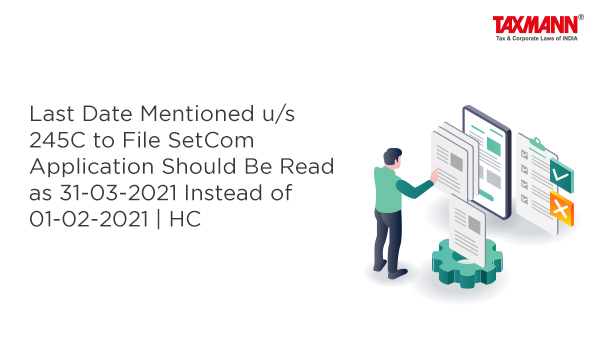Last Date Mentioned u/s 245C to File SetCom Application Should Be Read as 31-03-2021 Instead of 01-02-2021 | HC
- Blog|News|Income Tax|
- 3 Min Read
- By Taxmann
- |
- Last Updated on 23 November, 2023

Case Details: Jain Metal Rolling Mills vs. Union of India - [2023] 156 taxmann.com 513 (Madras)
Judiciary and Counsel Details
-
- Sanjay V. Gangapurwala, CJ. & D. Bharatha Chakravarthy, J.
- J.D. Mistry, R. Sivaraman, Vandanay Vyas & P.S. Raman for the Petitioner.
- Prabhu Mukunth Arunkumar, A.R.L. Sundaresan, Rajesh Vivekanathan, A.P. Srinivas & A.N.R. Jayaprathap for the Respondent.
Facts of the Case
Assessee filed an instant petition to challenge the constitutional validity of the amendment to section 245A discontinuing operations of settlement commission w.e.f. 1-4-2021. This was done by inserting various sub-clauses and proviso to the existing sections and inserting new sections 245AA and 245M by way of the Finance Act, 2021, with retrospective effect from 1-2-2021.
The above amendment was challenged on the ground that such amendment was arbitrary, illegal and void and also infringed the fundamental rights conferred under articles 14, 19(i)(g), 20, 20(2) and 21 of the Constitution of India 1950.
Assessee also challenged the validity of Circular, dated 28-9-2021, in as much as it restricted filing of the application before the Interim Board for Settlement only by assesses who were eligible to file an application for Settlement on 31-1-2021.
High Court Held
The Madras High Court held that the Income-tax Settlement Commission (ITSC) was made inoperative with effect from 1-2-2021 by virtue of proviso to section 245B. Similarly, section 245C(5) also played an embargo that no application shall be made under the section on or after 1-2-2021. The proviso to section 245D(2C) deemed that if no order was passed as of 31-1-2021 under the section, the application was deemed to be valid.
The legislation in question was given retrospective effect starting from February 1st, 2021 when the Bill was introduced in the Parliament. This move aimed to inform taxpayers and the public about the impending policy decision to render the ITSC inoperative.
The retrospective period spans merely two months, evidenced by the Act being officially notified on 01-4-2021. Importantly, this action doesn’t pertain to imposing taxes. Thus, it can’t be argued that the parties acted as per the law in force at the relevant time. Therefore, the act of the State in abolishing the ITSC with effect from a cutoff date per se cannot be illegal or ultra vires the Constitution.
However, until March 31st, 2021, the Income Tax Settlement Commission (ITSC) remained legally and factually operational. Eligible assesses retained the right to approach the ITSC if they had pending cases. Even for assessments or reopening proceedings initiated between February 1st, 2021, and March 31st, 2021, the assessees could approach the Commission.
Any applications submitted without a final order before January 31st, 2021, were considered ‘pending applications’. The legislation’s primary goal was to abolish the ITSC and establish an Interim Board to handle these pending applications. Notably, even cases arising before the Act’s notification on April 1st, 2021, but after the cutoff date of February 1st, 2021, were eligible for ITSC consideration.
The purpose of the retrospective legislation is to make the ITSC inoperative right from the date of the introduction of the Bill and to send all the pending applications to the Interim Board. As a matter of fact, the Central Government has to make a Scheme for Settlement with respect to pending applications by the Interim Board as per section 245D(11), and such a scheme has to be placed before the Parliament.
Thus, there was no intent, nor was it within the purpose to do away with the ‘pending applications’ with respect to matters in which the ‘cases’ arose from 1-2-2021 to 31-3-2021. Thus, it was necessary to read down the last date mentioned for filing applications in section 245C(5) as 31-3-2021, and consequently, the last date mentioned in the Circular should also be read as 31-3-2021.
Disclaimer: The content/information published on the website is only for general information of the user and shall not be construed as legal advice. While the Taxmann has exercised reasonable efforts to ensure the veracity of information/content published, Taxmann shall be under no liability in any manner whatsoever for incorrect information, if any.

Taxmann Publications has a dedicated in-house Research & Editorial Team. This team consists of a team of Chartered Accountants, Company Secretaries, and Lawyers. This team works under the guidance and supervision of editor-in-chief Mr Rakesh Bhargava.
The Research and Editorial Team is responsible for developing reliable and accurate content for the readers. The team follows the six-sigma approach to achieve the benchmark of zero error in its publications and research platforms. The team ensures that the following publication guidelines are thoroughly followed while developing the content:
- The statutory material is obtained only from the authorized and reliable sources
- All the latest developments in the judicial and legislative fields are covered
- Prepare the analytical write-ups on current, controversial, and important issues to help the readers to understand the concept and its implications
- Every content published by Taxmann is complete, accurate and lucid
- All evidence-based statements are supported with proper reference to Section, Circular No., Notification No. or citations
- The golden rules of grammar, style and consistency are thoroughly followed
- Font and size that’s easy to read and remain consistent across all imprint and digital publications are applied



 CA | CS | CMA
CA | CS | CMA
